Alexander the Great’s Sword: The Blade That Conquered the World
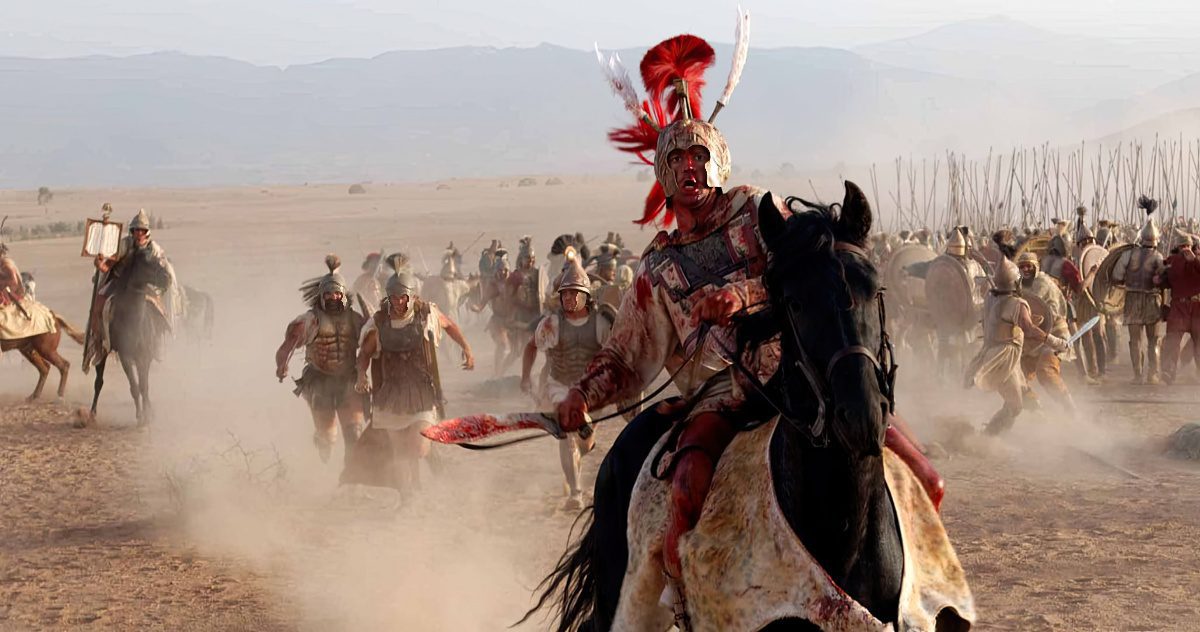
What’s in this article?
Alexander the Great’s sword is a legendary artifact that has captivated historians and sword lovers for decades. He was one of history’s most illustrious conquerors, and his sword represented more than just a practical combat and warfare tool.
History buffs have long been intrigued by the rise and fall of great empires, specifically the practice of associating a particular leader’s ascension to power with the brandishing of a legendary sword. Here, we’ll talk about Alexander the Great’s sword, which he carried into combat from the Balkans to the Indus Valley. After discussing its features, most useful applications, history, and myths, we’ll tell you if it still exists today.
Who is Alexander the Great?
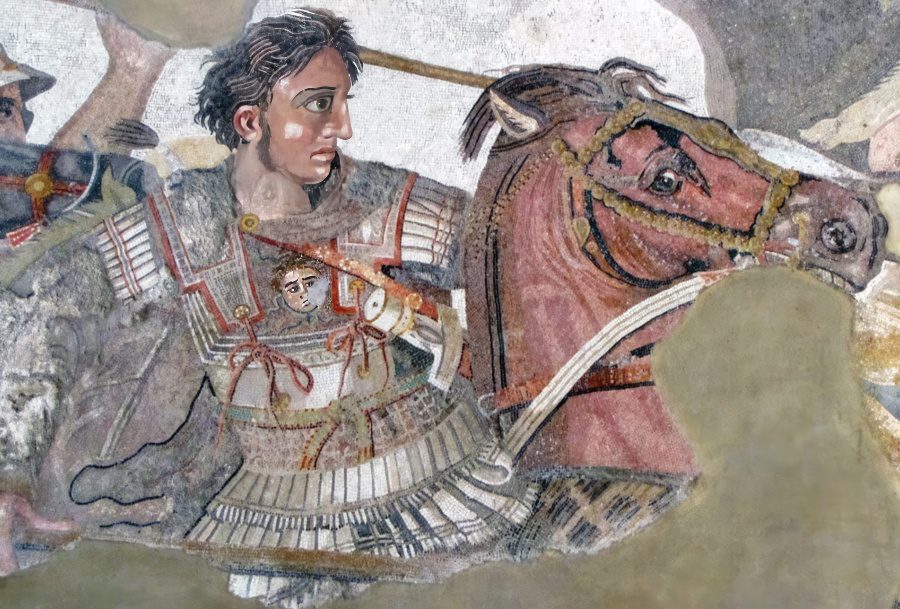
Alexander the Great, ruler of ancient Macedon from 336 to 323 B.C., is famous for expanding his kingdom’s influence far and wide, including subjugating the whole of ancient Greece and defeating the powerful Persian Empire. From a young age, he was profoundly affected by both his father, King Philip II of Macedon, and the ancient Greek philosopher Aristotle. By the age of 20, Alexander succeeded his father as king of Macedon upon the latter’s death.
He then became Alexander III of Macedon and is considered one of the most successful and greatest military strategists in history. Because of how effective his military campaigns were, modern generals still look to his methods for guidance.
Alexander was one of the few generals in history who led his forces into combat and guided them to victory under his direct leadership. On multiple occasions, despite being injured, he still led his troops on horseback into battle. With a sword in his hand to lift the spirits of his allies, he continued to strike fear into the hearts of his enemies.
Characteristics of Alexander the Great’s Sword
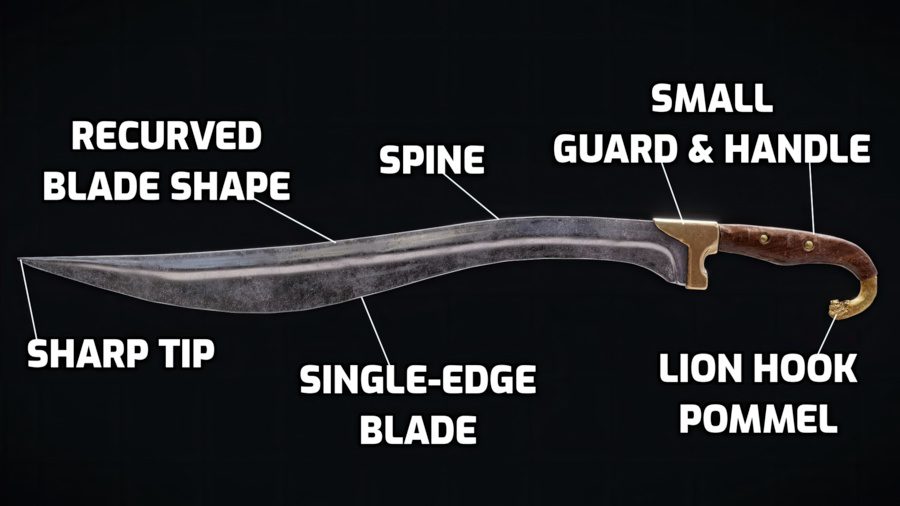
The sword of the ancient Macedonian King Alexander was called a Kopis, a type of ancient Hellenic sword. Blades like these were extremely widespread during his lifetime, and they were effective for slicing both on foot and from horseback when used with a shield. It is not to be mistaken with the similar Iberian (Spain) Falcata sword that coexisted at the time.
During his lifetime, Alexander the Great probably used more than one sword in battle. He could very well have used the Xiphos sword too, which is another Hellenic type of blade.
Blade
Alexander had an iron sword with a single-edged blade, meaning it was only sharpened on one side. It had a forward-swept recurve, a fairly common shape in the ancient world, mainly made for powerful hacking and slashing attacks that could damage shields, breastplates, and helmets. The sword’s blade had a sharp and pointy tip which could be used for stabbing as well as thrusts.
The Roman Gladius, which was very effective in battle, had roughly the same blade length as the sword of Alexander, at around 21 to 22 inches (53 to 56 cm).
Guard
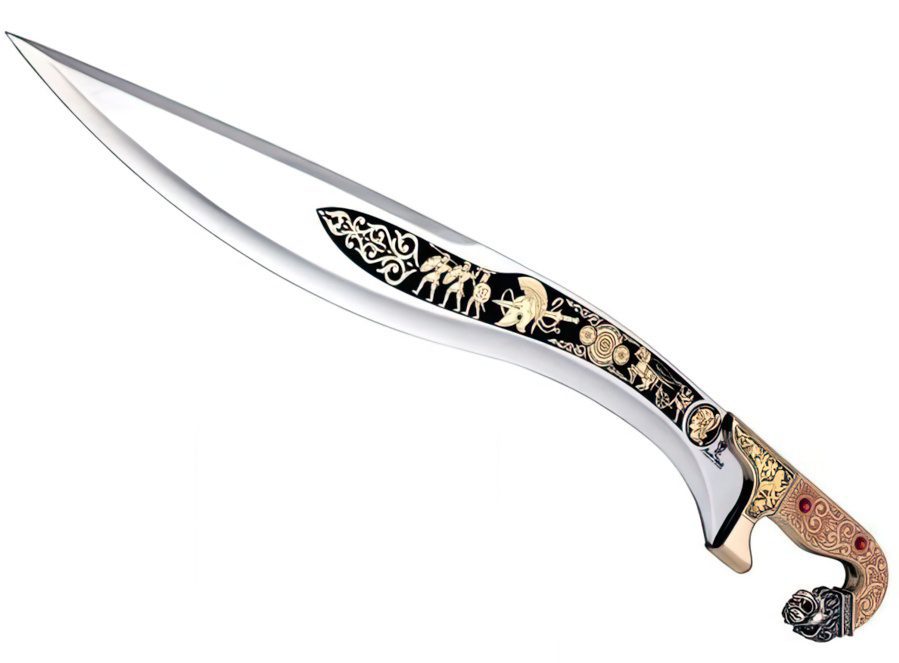
Alexander’s sword does not feature a real guard per se, although not many sword from the time did. The main reason behind this is that the weapon of choice was a spear or a large sarissa pike, while swords would be carried on the waists in a scabbard or baldric. This small type of guard could be made out of bronze and served as a hand stopper to the wielder’s hand, although it offered limited protection.
Handle
The handle of Alexander’s sword was straight and curved like a hook at the end toward the pommel. Just like a regular Kopis sword, it was made out of wood with metal caps holding it together into the full tang blade beneath it.
Pommel
The hook of the handle at the very end is the pommel of Alexander’s sword. This curve played an important role in giving the user a highly comfortable grip, especially when used for hacking and slashing attacks when mounted on horseback.
In the case of Alexander’s sword, it is believed that the pommel could have a lion shape representing bravery and strength and was an important symbol in ancient Macedonia. There are cases on Kopis swords where a cord was tied between the pommel and the guard, which was possibly the case with this sword as well.
Weight
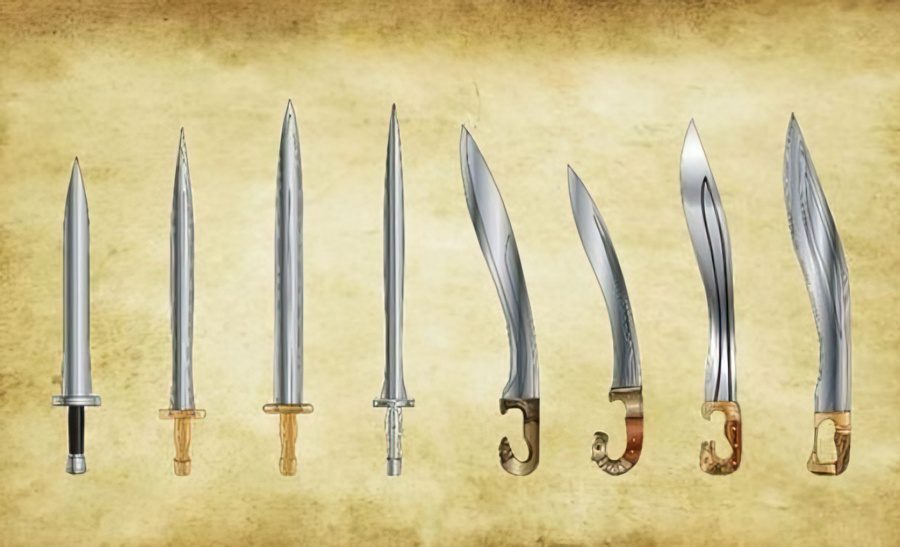
A blade with a belly meant for powerful slashing and chopping attacks must be on the heavy side, despite its smaller length. The most usual length for the sword of Alexander the Great, if he were using a Kopis, would have been in the range of 2 to 2.9 lbs (0.9 to 1.3 kg).
Length
The length of the swords used by Alexander and previous hoplites throughout the Hellenic world was on the smaller side due to the primary use of spears and large shields. The overall length of Alexander the Great’s sword was around 26 inches (65 cm) long.
Ancient Macedonian warriors are known to have used swords that were the same length as the Spartan sword, but shorter than those used during later periods of the Greek states.
How did Alexander the Great Use His Sword?
Alexander is known as a warrior who personally led cavalry divisions and ranks of soldiers in the majority of his battles. He would have used the long spears, sarissa pikes, or xyston but there were instances where he used his sword. The Kopis or Xiphos, which he would have used, are both very fast and one-handed weapons primarily used for slashing attacks.
Slashing & Chopping
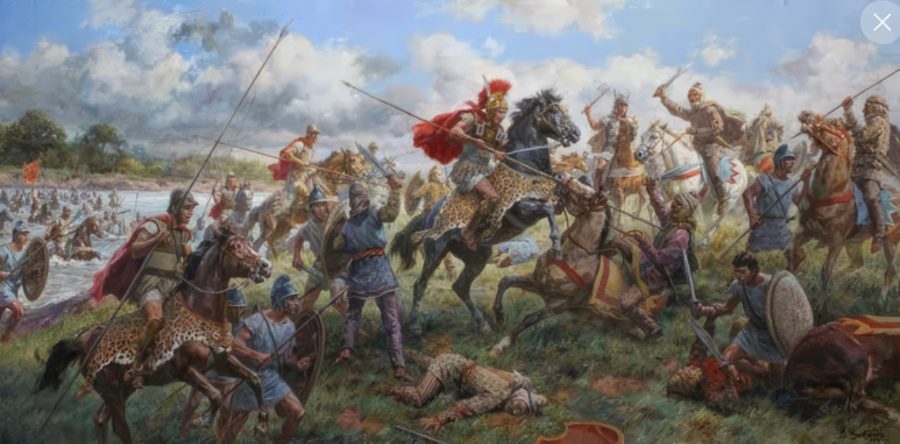
Alexander’s sword would have been an ideal weapon for cutting and chopping. Its recurve design allowed it to be used with more momentum for cutting and causing blunt trauma if hitting a helmet, as the skull was vulnerable to cracking. He also used a Xiphos leaf-bladed sword, which was the better choice when on foot because it could easily thrust while also being an excellent slashing weapon.
Mounted
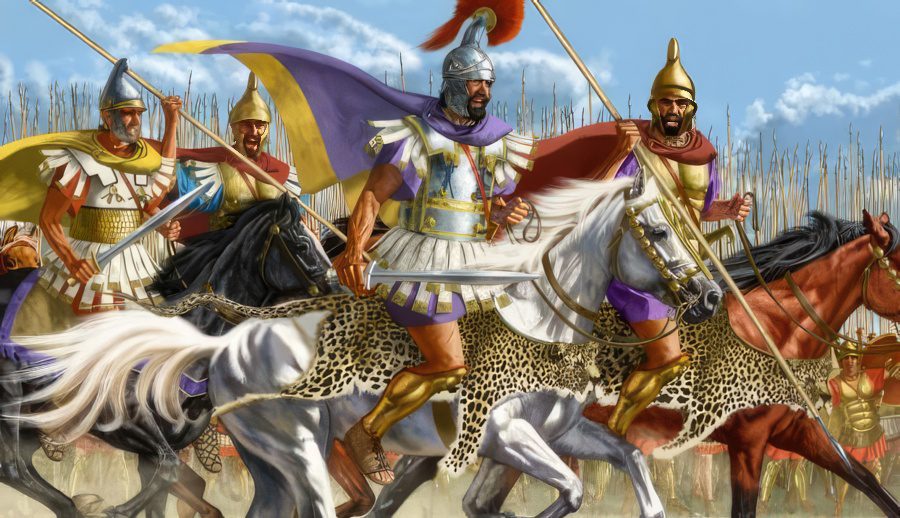
Alexander the Great was one of the great military leaders that structured calvary battle formations significantly. He is often described fighting from a mounted position taking advantage of his horse’s speed while using his deadly Kopis or Xiphos to excel in battle.
Motivational and Ceremonial
The sword acted as a powerful ceremonial tool linked with nobility long before the time of Alexander III, which was often the motivation behind the speeches given by this great general. With his sword in hand, he motivated his soldiers to carry on fighting to fulfill his plans of victor.
Defeated monarchs showed Alexander respect and humility by giving him swords as gifts. Swords were in their prime during the many fights for throne that stretched from Egypt to Afghanistan and India. King of Kitium Pumiathon, is one such ruler who gave Alexander a sword that the great conqueror carried by his side, as described by Greek philosopher Plutarch.
History and Legends
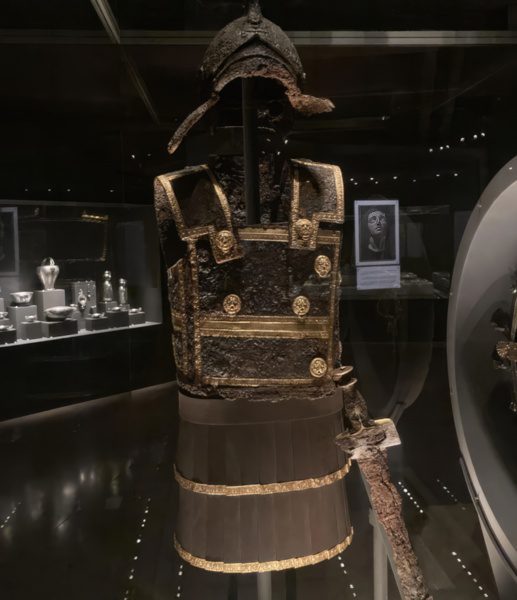
The most important thing to know about Alexander the Great was that he was a lancer first and a sword user second. While he was experienced in both of these weapons, several stories tell of his injuries in combat. Despite his wounds, he continued to fight as it was an ancient Macedonian tradition for a king to take part in battle at all costs.
The best soldiers under his ranks were the so-called “Companions” which he would directly lead into battle and never fought without them. Charging with a spear or a Xyston was his primary choice and in cases where he lost his spear, he would ask one of his companions to lend him another, as described by Arrian, an ancient historian.
Though it may not have been his first weapon of choice, there were instances where Alexander the Great’s sword was in great use. There are also tales of how he used different swords to take down his enemies, as told directly by Plutarch.
Because he grew up primarily trained on horseback, we would like to think that the Kopis would be his sword of choice. Xenophon, an ancient Greek militarist, advised using the Kopis as a mounted weapon in his guide, Horsemanship.
Untying the Gordian Knot
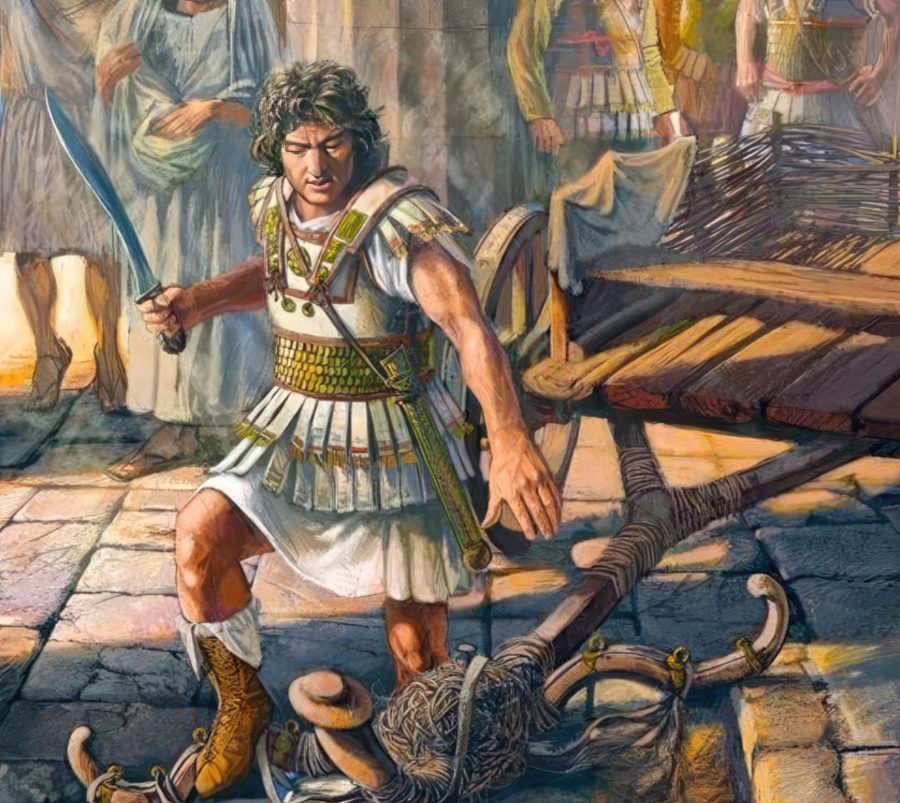
The myth of the Gordian Knot is well-known throughout the world. King Gordius supposedly tied an impossible knot, and the oracle said that whoever untied it would control all of Asia. When Alexander the Great reached Gordium, he attempted to untangle the knot but failed. He then took a courageous step and sliced the knot in half with his sword, proclaiming that the vision had come true.
Alexander’s actions have been interpreted in various ways, with some praising his bravery and inventiveness and others calling it a disrespectful and despicable solution. Although the prophecy was fulfilled in a roundabout fashion, Alexander went on to capture a large portion of Asia. Since then, the Gordian Knot has become shorthand for any complex or tough problem that can be resolved by taking immediate and decisive action.
Where is Alexander the Great’s Sword Now?
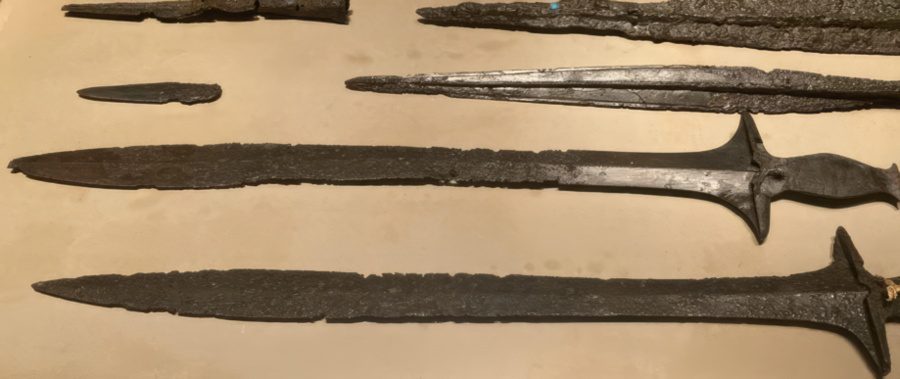
The exact location of Alexander the Great’s Sword is unknown because we don’t know exactly what sword is being looked for. Alexander used iron swords, and iron-bladed swords needed much more maintenance, and tended to rust easily if left uncared for. Being in massive battles as Alexander was, he would have used a couple of swords in his lifetime.

Some archeologists call the Vergina sword Alexander’s sword, which was given to him as a gift by a king in Cilicia (Asia Minor) and that currently lies in the tomb of Vergina in Greece. Plutarch described it as a gold-plated weapon that Alexander would use in battles, but he likely used different Kopis and Xiphos swords.




